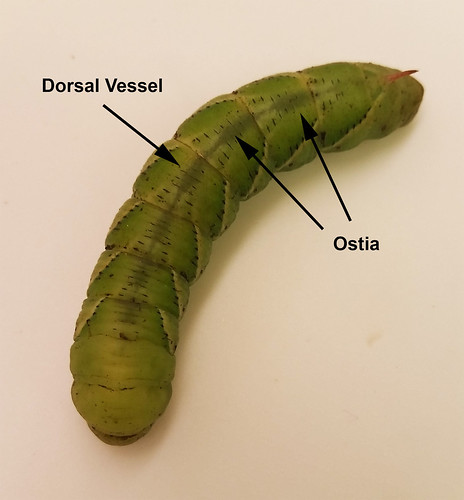Insects don’t have hearts like the rest of us. Instead of a multi-chambered heart, they have a dorsal vessel with multiple chambers separated by valves called ostia. A substance called hemolymph, which functions similarly to blood, gathers in these chambers, which are contracted by wing-shaped alary muscles to pump the hemolymph from the abdomen towards the head.

While humans have a closed circulatory system where all of our blood is contained in arteries and veins, insects have an open circulatory system where hemolymph flows freely through a cavity called the hemocoel. The hemolymph then gathers in the chambers of the dorsal vessel and is pumped back up towards the head, so that the brain and other major organs can be bathed in the nutrient-rich hemolymph. The hemolymph continues to flow down through the rest of the body, until it gathers back in the chambers, repeating the process.
Is hemolymph the same as blood? Not exactly. While our blood carries oxygen to our cells, insects don’t need this: they have a separate system of tubes called trachea that allow oxygen to reach their cells and carbon dioxide to be released. Instead of transporting oxygen, hemolymph transports nutrients around the insect’s body. Hemolymph also carries immune cells called hemocytes, playing an important role in an insect’s immune system.
You can see the dorsal vessel in action in the tobacco hornworm below:
Special thanks to Anne Jones and the Tumlinson Lab for allowing me to poke, photograph and video their Manduca sexta.
A Monarch caterpillar gathered from my garden and raised indoors was oozing hemolymph, to the point where is was wet enough to fall off a milkweed stem. It appeared to be “vomiting” is the best way to describe it. This went on for a day and it seemed like a goner, but the next day it was fine, continued to develop and eventually pupated and eclosed on schedule. Fearing the milkweed was contaminated I changed it all out. A couple of other caterpillars exhibited symptoms but not as severe, and they all developed normally. This has never happened before. Any insight into what caused this would be appreciated.